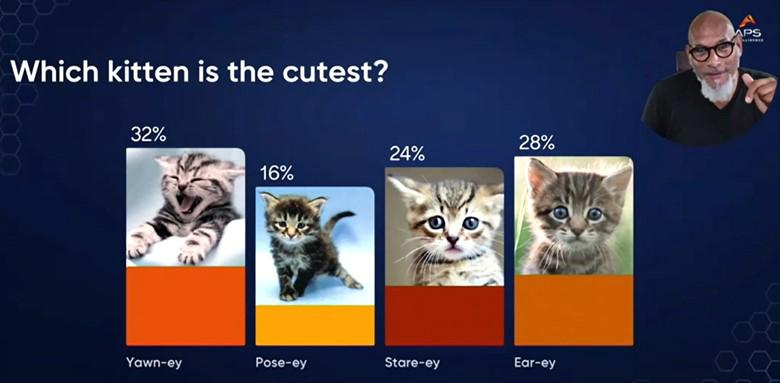Former NBA Player Turned Psychologist Offers Team-Building Advice

Professor John Amaechi is no stranger to working on a team. He is an organizational psychologist, the founder of APS Intelligence, a New York Times best-selling author, an officer of the Order of the British Empire and a retired NBA player.
During a recent lecture in the Deputy Director for Management series, Amaechi gave NIH’ers tips on establishing good leadership and cohesive teams.
He began by displaying four kittens on screen, then asked, “Which kitten is cutest to you?”
Among the four, two cats named Yawn-ey and Ear-ey won convincingly. The results came as no surprise to him.
Amaechi’s firm has collected 28,000 responses on this question from countries worldwide. Even after accounting for potential left-to-right bias or confounding variables, Amaechi said the result is the same every time— Ear-ey and Yawn-ey first and Pose-ey last. According to the psychologist, this phenomenon can be attributed to humans’ natural attraction to symmetry, and evidence that the brain ties symmetry to beauty and fitness.
“It’s fascinating to think that, as leaders, we’re in a position where our subconscious or non-committed thoughts can have such a radical impact over what we think is cute or clever, or who we think is worthy,” said Amaechi. “We discriminate in this way as leaders and it’s just worth remembering.”
Amaechi also highlighted what he considers the warped view that society has on what a leader looks like.
“There’s a sense that great leaders are just slightly menacing and frightening, enigmatic, aloof, impenetrable, powerful and omniscient,” he said. These traits, he noted, are not conducive to a successful team.

Amaechi and his firm asked senior C-suite leaders in health and social care what characteristics made a good leader when they started working in the sector. The top answers were charisma, confidence, experience and male. He dismissed charisma as a term used only for men, defining it as a term used “when we don’t know how a man is so successful while simultaneously being so abrasive.”
Amaechi also disputed the importance of confidence in a leader or teammate. “Everybody in this room knows somebody who would be so much better for your team if they were a little less confident,” he said.
But the tides appear to be changing in people’s understanding of leadership. When the same group of senior leaders was asked what leadership traits are important in the present day, their answers were much different. Empathy was the most common response. Other popular responses included vision, communication and honesty.
So, what traits make a good leader? The NIH’s website is a good place to find that answer, said Amaechi. He admitted to scouring NIH’s site in preparing for this seminar and agreed with what he found on NIH’s Office of Human Resources mentoring hub: that a leader should be devoted to promoting continual learning, creating positive change by sharing their expertise and knowledge with others, and always seeking out new perspectives. And the list goes on.
Amaechi also encouraged leaders to be open and vulnerable with their team, because “if you know everything, why would anybody around you ever think they have to contribute? If you’re invulnerable, why would anybody ever think they must support you?”
Team members, like leaders, should be willing and able to get to know one another. But they should also know themselves and maintain self-awareness.
“There’s a gap between one’s personal knowledge of themselves and what others see,” Amaechi said. “So, a person’s own perceived directness and honesty—a good set of qualities—can come across as cruel, callous and thoughtless. Those people disassemble teams.”
And though Amaechi clarified that offering feedback “is not a license to eviscerate your colleagues,” he also said team members should offer colleagues and leaders feedback on blind spots that could make the team less effective.
Agency, transparency, communication, trust and psychological safety are his five pillars of team success.
To build trust and psychological safety among team members, Amaechi offered a simple piece of advice: talk to them when you don’t need anything from them. Even just a few minutes chatting in the hallway, truly being in the moment and connecting with colleagues can go a long way in forming that trust.
He concluded with a story of a fan encounter he had with a young boy during his time with the Cleveland Cavaliers. He shook the boy’s hand and gave him an autograph, but the short interaction proved to have a lasting impact.
Amaechi received a note from the boy over a decade later. The fan wrote that he had followed Amaechi’s career— “not the old one, the one that mattered.” That young boy grew up to be a psychologist in Cleveland today.
Amaechi concluded with this message: “You are more influential than you know. Everyone is a giant to someone.”
NIH’ers can watch the full seminar at https://videocast.nih.gov/watch=54384.
